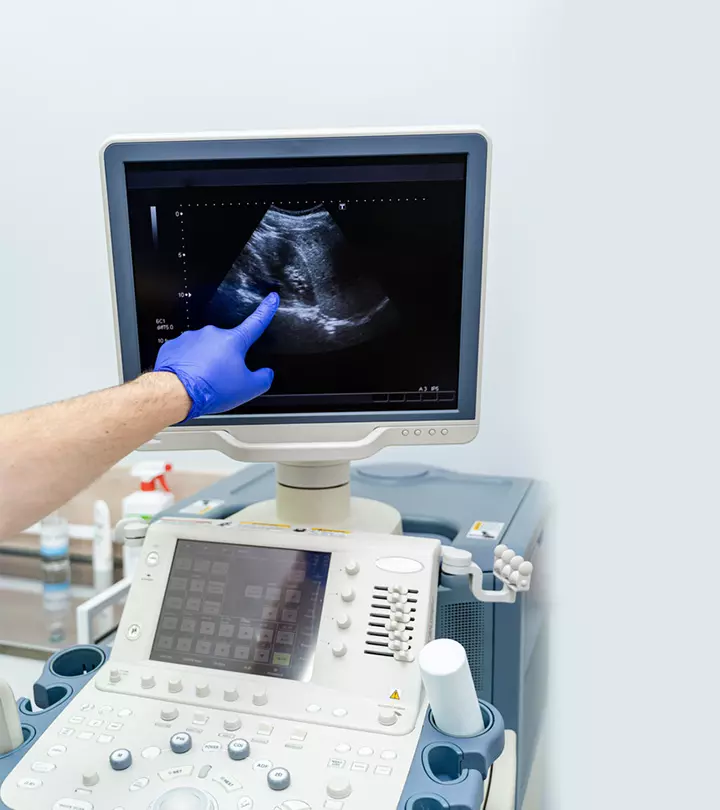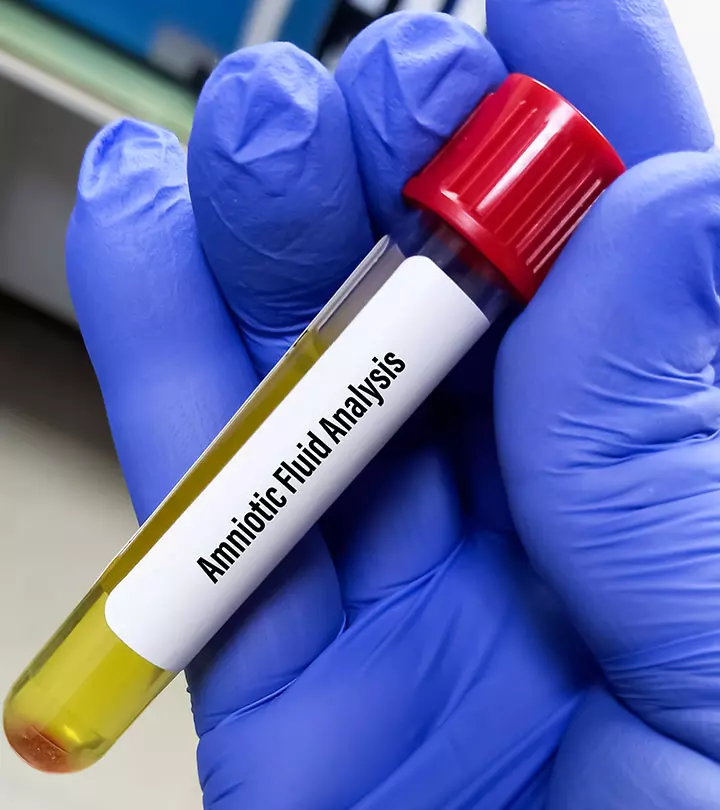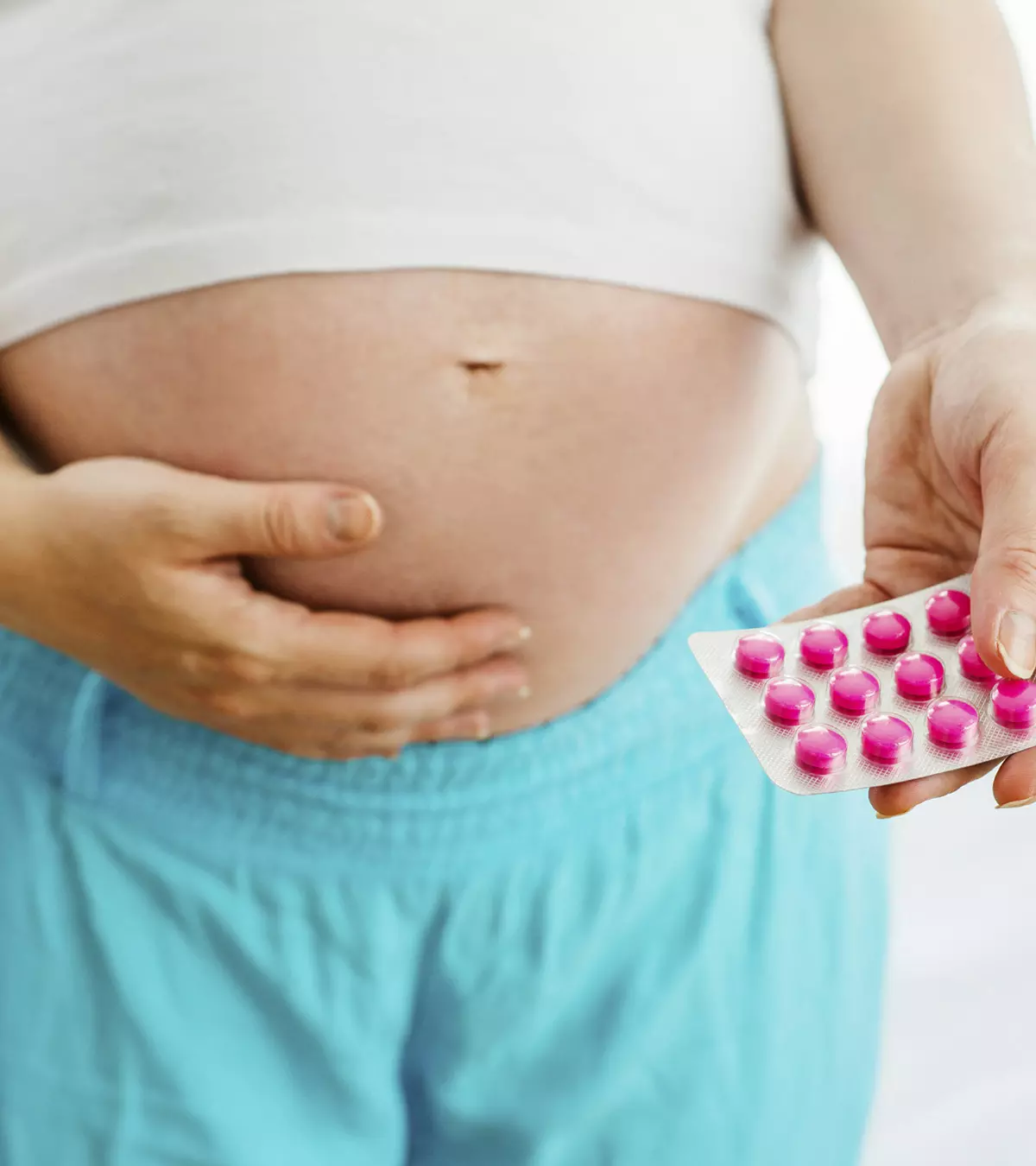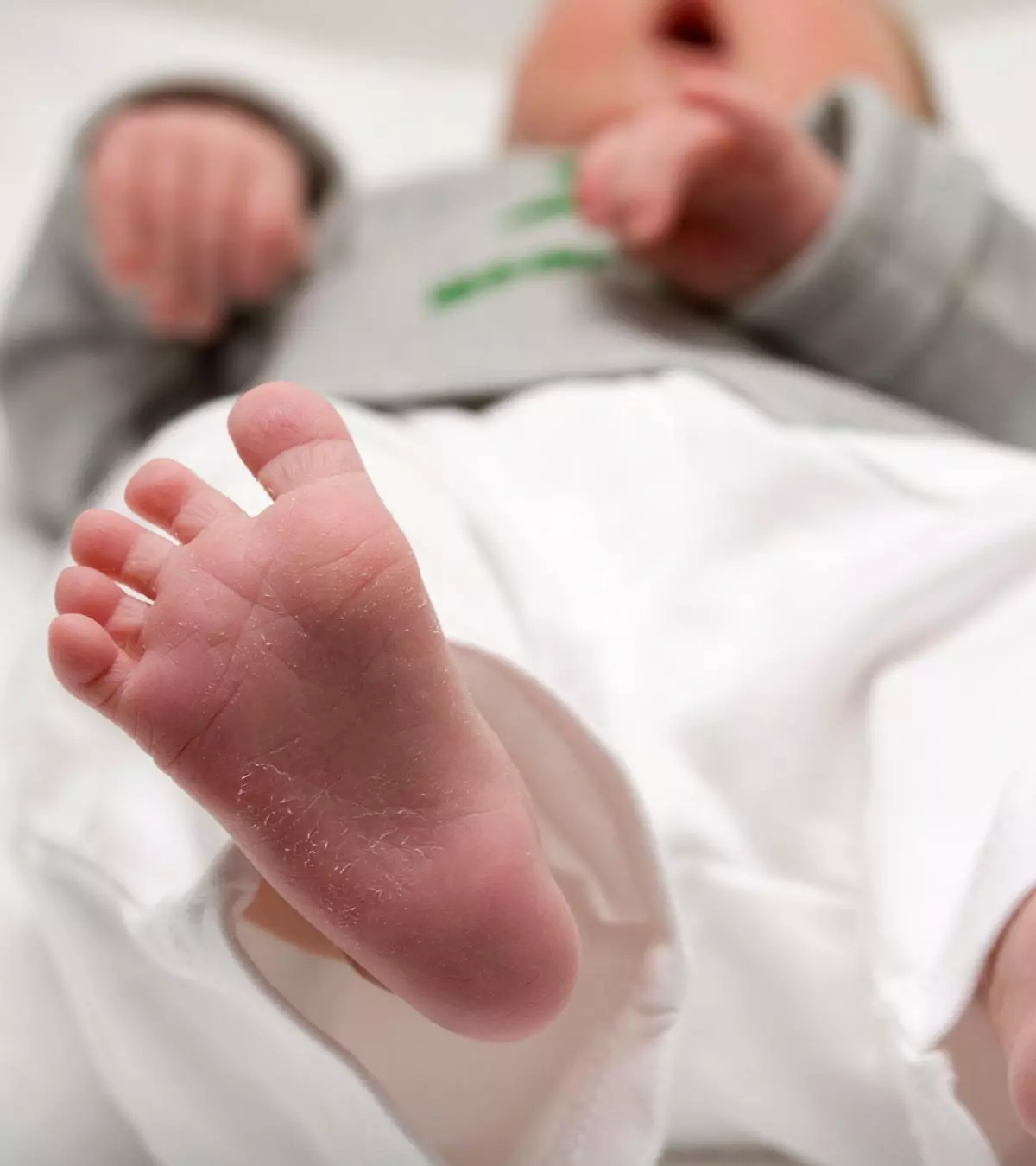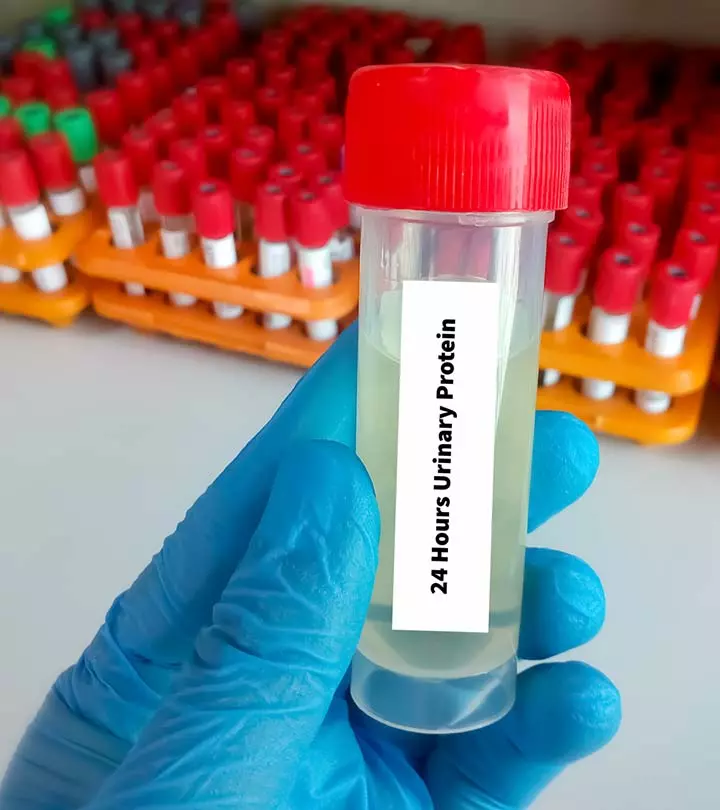
Image: iStock
Screening for protein in urine during pregnancy is a part of your routine prenatal care (1). During pregnancy, your urinary protein excretion gets doubled and can reach up to 300mg/24 h against 150mg/24 h in non-pregnant individuals. According to the American College of Obstetrics and Gynecology (ACOG), if your urinary protein excretion exceeds 300mg in the 24-hour collection, has a protein/ creatinineiA waste product of muscles removed from the kidneys through urine ratio ≥0.3mg/mg, or gives 2+ or more readings on urine dipstick testing, it can be defined as proteinuria or high protein in urine during pregnancy (2). Read on to know the causes of increased urinary protein excretion during pregnancy, its risk factors, symptoms, and how it can be treated in a pregnant woman.

Key Pointers
- Pregnancy, pre-existing chronic kidney disease, diabetes, urinary tract infection, preeclampsia, and HELLP syndrome can cause high protein in urine during pregnancy.
- Risk factors for high urine protein in pregnancy: Multiparity, age >35, obesity, history of preeclampsia, chronic high BP or diabetes.
- Protein in urine may not cause symptoms, but high levels in pregnancy may lead to foamy urine, swelling, nausea, and muscle cramps.
- Control high protein in urine during pregnancy by monitoring blood glucose levels, healthy eating, exercise, limiting salt and protein intake, and maintaining hygiene.
What Causes High Protein In The Urine During Pregnancy?
The following conditions can lead to high protein in the urine during pregnancy (2) (3).
- Pregnancy itself is a cause of proteinuria. During pregnancy, your urinary protein excretion increases up to two times due to an increased blood volume. The larger blood volume may subsequently lead to a relative decrease in concentrations of serum creatinine and urea, with an increase in protein excretion (4).
 Research finds
Research finds- A pre-existing chronic kidney disease (CKD), chronic hypertension, or type 1 or 2 diabetes mellitusiA metabolic disease characterized by high sugar levels in the blood may also cause chronic proteinuria in the early stages of pregnancy (within 20 weeks of gestation) (1).
- Urinary tract infection (UTI) during pregnancy can also cause a transient increase in urine protein levels; hence, the term transient proteinuria (1).

- PreeclampsiaiA pregnancy disorder characterized by high blood pressure, water retention, and protein content in urine can lead to albuminuria in the later stages of pregnancy. The condition is associated with gestational hypertension; hence, referred to as gestational proteinuria. According to the US Centers for Disease Control and Prevention’s (US CDC) Morbidity and Mortality Report, pregnancy-associated hypertension was reported in 13% of all pregnant women in the US in 2019 (5).
- HELLP syndrome (hemolysisiA condition causing the destruction of the red blood cells and the release of hemoglobin in the blood , elevated liver enzymes, and low platelet count), a severe form of preeclampsia in pregnancy, may also lead to a high protein in the urine of a pregnant woman (6).
- Lupus Nephritis, an autoimmune condition affecting the kidneys, can cause significant proteinuria during pregnancy (7). According to the Lupus Foundation of America, women with lupus nephritis have an increased risk of developing preeclampsia and other complications during pregnancy (8).
Dehydration, high-stress levels, exposure to very cold temperatures, fever, and intense physical activity are additional factors that can lead to short-term increased protein levels in the urine (7).
What Are The Risk Factors For High Protein In Urine During Pregnancy?
Certain risk factors that may increase the likelihood of high protein in the urine during pregnancy include (9) (10):
- Multiparity (a woman who has given birth more than once)

- History (personal or family) of preeclampsia with previous pregnancies
- Age over 35 years
- Obesity (BMI over 30)
- Health conditions, such as chronic high blood pressure or diabetes (type 1 or type 2)
What Are The Symptoms Of Protein In Urine?
You may not notice any symptoms of a mild increase in urinary protein levels. However, high protein levels in urine during pregnancy could cause the following symptoms (11) (12).
- Frothy, foamy, or bubbly urine
- Swelling (edema) in your hands, feet, belly, or face
- Frequent urination
- Feeling nauseous and an urge to vomit
- Muscle cramps at night
- Difficulty breathing
- Fatigue
- Loss of appetite
- Swelling around the eyes
Additionally, since proteinuria is strongly associated with preeclampsia during the later stages of pregnancy, you should also look for symptoms of preeclampsia.
These symptoms may include (13):
- High blood pressure during pregnancy(≥ 140/90 mg/Hg)
- Lower back pain

- Vision changes, including light sensitivity and blurry vision
- Shortness of breath
- Facial edema
- Swelling of hands
- Headaches
- Pain in the upper right side of the abdomen
If you notice any of these symptoms, promptly contact your healthcare provider. Conditions like preeclampsia require prompt medical attention to ensure the safety of both the mother and baby. Regular prenatal check-ups can help detect and manage any complications early.
How Can Protein In Urine Be Tested During Pregnancy?
There are various tests to determine protein levels in the urine of pregnant women (2) (3) (14).
- 24-hour urine collection (24-hour urine protein test):It is a common test for determining urinary protein excretion during pregnancy. However, this test may yield erroneous results during pregnancy due to factors such as insufficient collection, ureters physiological dilatation, and incomplete bladder emptying. A mother who is pregnant for the second time discusses her early pregnancy lab results on her YouTube channel. She says, “I had undergone an early pregnancy lab test where I underwent a 24-hour urine test. The results confirmed the presence of baseline-level proteins in my urine. I was told that every time I go in for a checkup in the coming weeks, my urine will be examined to detect fluctuations in protein levels (i).” Continuous monitoring may help in reducing the chances of erroneous results.
- Urine dipsticks: It is a low-cost test for proteinuria based on its pH. However, this test may yield erroneous results for predicting substantial proteinuria in pregnancy. Also, because it can only detect albumin levelsiThe level of albumin ( a protein made by the liver) as detected by a blood test , it may produce false-negative results when proteinuria includes additional proteins such as transferrin, immunoglobulins, and low-molecular-mass proteins.
- Acetic acid/ Sulfosalicylic acid: It is a test that employs a heat coagulation test to determine proteinuria in pregnancy. This test has an advantage over the urine dipstick test for detecting other proteins.
- Urine protein to creatinine ratio: This test employs spot urine analysis for protein/creatinine ratio. It is a more reliable, accurate, and simple way of quantifying proteinuria than collecting urine for 24 hours.
- Albumin to creatinine ratio: It is a method of detecting urinary albumin to creatinine ratio (UACR) as an alternative to urine protein to creatinine ratio that accurately predicts severe proteinuria.
A study examined how well the spot protein-creatinine ratio (PCR) and albumin-creatinine ratio (ACR) can detect high levels of protein in the urine (proteinuria) in pregnant women with high blood pressure. These tests were compared to the gold standard 24-hour urine collection method. PCR was 91% accurate in detecting proteinuria and 89% accurate in ruling it out when a cutoff concentration was used. The study found that the spot PCR test is a reliable alternative to the 24-hour urine test for detecting protein in urine, especially when the first-morning sample is excluded. The ACR test may help rule out proteinuria, but more research is needed to confirm its accuracy (15).
How Is High Protein In Urine Treated?

Proteinuria is not a disorder but a condition caused due to various factors and medical conditions in pregnant women. However, you should be attentive to your protein urine levels and should not neglect them.
If you have a mild increase in the levels of protein in the urine, simple dietary and lifestyle modification can be useful. Proteinuria during underlying conditions, such as hypertension and infection, will require the treatment of the condition through medications to cure proteinuria eventually (11) (16). The doctor may also suggest lifestyle changes, such as including regular exercises and avoiding certain foods to reduce protein levels in the urine. Reduce your salt and protein intake, eat a healthy diet, eat more fiber, keep yourself hydrated, quit smoking and tobacco use, and check your blood sugar regularly during pregnancy (12). The doctor may also suggest bed rest to alleviate stress and reduce blood pressure in some cases.
How To Prevent High Protein In Urine During Pregnancy?
While proteinuria during pregnancy cannot be prevented, you may take the following measures to control its underlying causes and its further impact (3) (11).
- Monitor your blood glucose levels on a regular basis
- Attend regular prenatal checkups
- Adhere to a healthy eating plan
- Limit the intake of caffeine and processed foods
- Do pregnancy-friendly physical activities
- Limit the intake of salt and protein in your diet

- Maintain a healthy weight, especially during pregnancy, as excess weight gain is a risk factor for gestational diabetesiPregnancy-specific condition characterized by high blood sugar levels, which may pose a risk of complications or preeclampsia
- Take prescribed medications in recommended doses
- Take adequate rest
- Drink plenty of water and fluids
- Maintain good hygiene
- Avoid smoking and alcohol intake
Frequently Asked Questions
1. Can high protein in urine affect my baby?
While protein in urine does not have any direct adverse effect on your baby, it is a probable sign of many adverse pregnancy-related complications, such as preeclampsia, preterm birth, and fetal growth restrictions, which may negatively affect the fetus (13).
2. Can you have high protein in urine without preeclampsia?
Yes. Proteinuria or albuminuria may occur without preeclampsia due to other conditions such as renal dysfunction (problems in kidney function) and UTI during pregnancy (2).
3. Can drinking less water treat the cause of protein in urine?
No. Drinking water has nothing to do with protein levels in the urine. Drinking more water may temporarily dilute the protein in the urine but will not cure the condition (11).
4. Does stress cause protein in urine?
Being stressed during pregnancy can lead to a temporary rise in protein levels in the urine. Other contributing factors to increased protein levels include heavy exercise and improper diet (17).
5. Can a lack of water cause protein in urine?
Yes, dehydration or loss of water from the body can contribute to a rise in the protein levels in urine. Thus, staying hydrated while pregnant is essential to avoid obstetric complications.
6. How does proteinuria affect pregnancy?
A study showed that proteinuria before 20 weeks of pregnancy might result in lower fetal body weight, higher abortion, and neonatal death rate. Some other adverse complications that may arise due to proteinuria in pregnancy include miscarriage, preterm delivery, premature rupture of membranes, intrauterine growth restriction (IUGR), and intrauterine fetal death (18).
Urine contains some amount of protein, but when the protein levels increase, it leads to proteinuria. Most cases usually occur due to physiological changes in pregnancy, but some may occur due to underlying problems, including serious ailments such as preeclampsia, kidney problems, and diabetes. High protein in urine does not cause any issues to the fetus, but the conditions that cause high protein can have maternal health complications. Therefore, timely treatment of the causative conditions is essential since it also brings down the protein levels in the urine. A healthy lifestyle and prenatal care are some ways to prevent high protein in urine during pregnancy.
Infographic: How To Diagnose High Protein In Urine In Pregnancy?
While pregnancy can cause high protein in the urine, a more severe underlying condition, such as preeclampsia, could also be the reason. Therefore, it is important to be aware of the symptoms and the diagnostic process for the early identification of potential complications. Read through the infographic below for more details.
Some thing wrong with infographic shortcode. please verify shortcode syntaxPersonal Experience: Source
MomJunction articles include first-hand experiences to provide you with better insights through real-life narratives. Here are the sources of personal accounts referenced in this article.
i. Protein in urine | Early pregnancy lab results.https://www.youtube.com/watch?v=bTlEEwJAdyk
References
- Getting a Pregnancy Urinalysis: About Prenatal Urine Tests.
https://americanpregnancy.org/prenatal-testing/urine-test-urinalysis/ - Osman O and Maynard S; (2019); Proteinuria in pregnancy-Review.
https://www.oatext.com/proteinuria-in-pregnancy-review.php - Michele Mussap and Antonio Noto; (2025); Renal disorders in pregnancy.
https://pdfs.semanticscholar.org/bbf1/0f3d63a29971093e2ad34c318a6cf329805c.pdf?_ga=2.187458607.626578539.1640544297-1114939983.1636990935 - Indu Saxena et.al; (2013); Detection of Proteinuria in Pregnancy: Comparison of Qualitative Tests for Proteins and Dipsticks with Urinary Protein Creatinine Index.
https://www.ncbi.nlm.nih.gov/pmc/articles/PMC3809617/ - Nicole D. Ford et.al; (2025); Hypertensive Disorders in Pregnancy and Mortality at Delivery Hospitalization — United States 2017–2019.
https://www.cdc.gov/mmwr/volumes/71/wr/pdfs/mm7117a1-h.pdf - How do health care providers diagnose preeclampsia eclampsia and HELLP syndrome?
https://www.nichd.nih.gov/health/topics/preeclampsia/conditioninfo/diagnosed - Lupus Nephritis & Your Kidneys.
https://www.kidney.org/lupus-nephritis-your-kidneys - Lupus and Pregnancy.
https://www.lupus.org/resources/planning-a-pregnancy-when-you-have-lupus - Lulzime Dhora and Mirela Lika; (2015); Risk factors for proteinuria in pregnancy.
https://www.academia.edu/75347659/Risk_Factors_for_Proteinuria_in_Pregnancy - G.O. Ibeh et al.; (2006); Protein levels in Urine of Pregnant women in Rivers State Nigeria.
https://pdfs.semanticscholar.org/0e04/ccbce8545389650cc858ef26d39a476997a4.pdf - Protein in Urine (Proteinuria) Causes Symptoms & Treatments.
https://www.kidneyfund.org/all-about-kidneys/other-kidney-problems/protein-urine - Proteinuria.
https://my.clevelandclinic.org/health/diseases/16428-proteinuria - Preeclampsia.
https://my.clevelandclinic.org/health/diseases/17952-preeclampsia - Michal Fishel Bartal et al.; (2025); Proteinuria during pregnancy: definition of pathophysiology methodology and clinical significance.
https://www.ajog.org/article/S0002-9378(20)30989-3/fulltext - Louise J. Geneen et al; (2025); Protein-creatinine ratio and albumin-creatinine ratio for the diagnosis of significant proteinuria in pregnant women with hypertension: Systematic review and meta-analysis of diagnostic test accuracy.
https://www.sciencedirect.com/science/article/pii/S221077892100074X - K.Y. Loh and N. Sivalingam; (2007); Urinary Tract Infections In Pregnancy.
https://www.ncbi.nlm.nih.gov/pmc/articles/PMC4170332/ - Protein In Urine
https://medlineplus.gov/lab-tests/protein-in-urine/ - Eun Hui Bae et al.; (2016); Impact of random urine proteinuria on maternal and fetal outcomes of pregnancy: a retrospective case-control study.
https://pmc.ncbi.nlm.nih.gov/articles/PMC5668390/ - Phillips JK et al.; (2017); Examination of Prepregnancy and Pregnancy Urinary Protein Levels in Healthy Nulliparous Women.
https://www.ncbi.nlm.nih.gov/pmc/articles/PMC5933079/
Community Experiences
Join the conversation and become a part of our nurturing community! Share your stories, experiences, and insights to connect with fellow parents.
Read full bio of Dr. Irene (Eirini) Orfanoudaki
Read full bio of Reshmi Das
Read full bio of Rebecca Malachi
Read full bio of Aneesha Amonz








